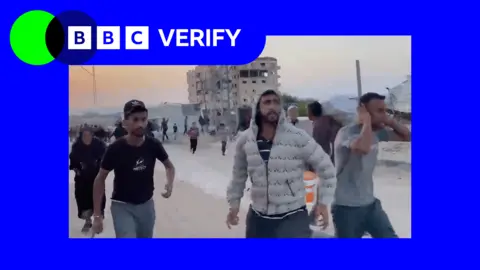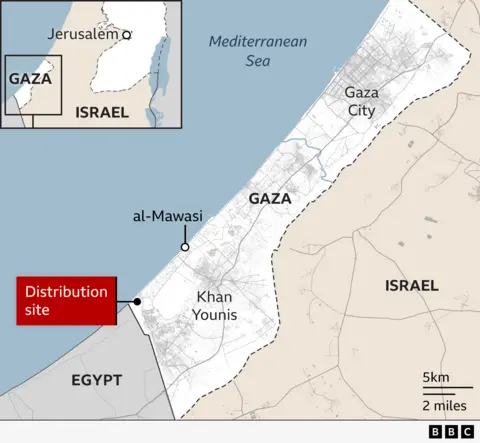Israeli army admits to Gaza strike after BBC Verify investigation
 BBC
BBCThe Israeli military has admitted to BBC Verify that it conducted a previously unacknowledged strike on the al-Mawasi area of southern Gaza, which reportedly killed at least one Palestinian and injured 30 others.
The strike took place on Sunday - hours after 31 Palestinians were killed in an incident near a new aid distribution centre in the city of Rafah, according to the Hamas-run Civil Defence agency.
While reviewing footage purporting to show the incident near the aid distribution centre, BBC Verify identified a separate strike in the nearby city of Khan Younis.
The blast was not previously announced by the Israel Defense Forces (IDF), which regularly publishes operational updates online.
It was only when approached by BBC Verify that the IDF admitted it had carried out an artillery strike and said the incident was the result of "technical and operational errors".
They said troops had fired towards a "target" but the artillery had "deviated" and "wrongfully hit the Mawasi area" - a coastal strip of Khan Younis. The IDF did not provide evidence for these assertions.
The IDF rarely acknowledges such "errors". A BBC Verify analysis of statements on the IDF's official Telegram account could only find four previous instances of it admitting to making a "mistake", "technical" or "operational" error relating to the war in Gaza since it began in October 2023.
The footage we reviewed from the Khan Younis blast first began to emerge late on Sunday evening. It showed bloodied bodies surrounded by dust clouds in an area where Palestinians were living in tents. Women and children could be seen running and screaming as they watched injured people carried away.
The Israeli strike hit an area where a number of displaced Palestinians had been sheltering. The UN has estimated that 90% of the strip's population of 2.1 million people have been forced to flee their homes.
Ambulances arrived on the scene to collect the injured shortly after the incident. BBC Verify identified a number of the same injured Palestinians in both the footage from the scene and later images from the hospital where they were treated.
One Palestinian was killed and 30 others were injured by the strike, according to the Kuwaiti Field Hospital.
The footage was initially falsely linked to killings near a controversial new aid distribution site in Rafah.
But BBC Verify geolocated the footage to a location in Khan Younis - 4.5km (2.8 miles) away from the distribution site.
The Hamas-run Civil Defence agency said "Israeli gunfire" had killed 31 Palestinians near the aid distribution centre. The Israeli army at first said it did not fire on Palestinians near the site, but a military source later told BBC Verify that troops had fired warning shots.

We used the position of the sun to ascertain that the footage was filmed in the evening, shortly before sunset. A local journalist who filmed footage of the scene also told BBC Verify that the incident occurred around 19:00 local time on Sunday - hours after the killings near the aid site.
The IDF statement did not offer a figure for those killed in the Khan Younis blast and said that "the incident is under review".
The footage showing the strike has been at the heart of a dispute between the BBC and the White House.
On Monday, BBC Verify reviewed the footage and debunked claims that it was connected to the killings near the distribution centre in Rafah.
Our debunk post was then picked up by White House Press Secretary Karoline Leavitt, who wrongly claimed that it showed the BBC had retracted its coverage of the aid centre killings.
In a statement, the BBC said her comments were "misleading", adding that she had been "conflating" the two stories.
"We did not remove any story and we stand by our journalism," the BBC statement said.
Israel launched a military campaign in Gaza in response to Hamas' cross-border attack, in which about 1,200 people were killed and 251 others were taken hostage.
At least 54,607 people have been killed in Gaza since then, including 4,335 since Israel resumed its offensive on 18 March, according to the Hamas-run Gaza health ministry.

